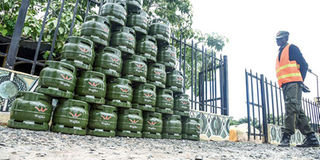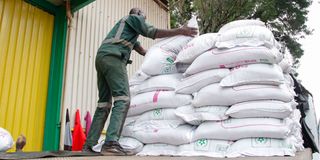
Businesses have not passed on to the consumers reliefs they have received from the State for various items, including bank loans, cooking gas, transport of sugar cane, fertilisers and airtime
Businesses have not passed on to the consumers reliefs they have received from the State for various items, including bank loans, cooking gas, transport of sugar cane, fertilisers and airtime.
This price rigidity has seen the government begin to roll back most of the incentives, even as some within the government mull unorthodox proposals such as price controls to guarantee lower prices to consumers.
“Often there is a strong profit motive from the shareholders to ensure there is aggressive profit growth,” said Ken Gichinga, an economist.
In a market economy like Kenya’s, it is normal for business owners to demand high profits and minimise costs. However, there has not been a rigorous discussion on what should happen when benefits aimed at relieving consumers are hijacked by businesses for their own benefit, with some experts calling for price controls while others recommend complete withdrawal of these incentives, saying do not serve their intended purposes.

LPG gas cylinders on sale at City Cabanas, Nairobi, on October 15, 2019. PHOTO | FILE | NATION MEDIA GROUP
Retail prices of cooking gas, for example, have remained high despite the decision by the government to remove the standard 16 per cent value added tax (VAT) to encourage the consumption of the relatively cleaner fuel and wean households from charcoal and wood fuel.
Instead, all the benefits, including the drop in global prices and the strengthening of the shilling, have been absorbed by multinational oil marketing companies that have enjoyed profit margins of as much as 156 per cent by paying Sh1,261 to refill a 13-kilogramme cylinder while charging consumers upwards of Sh3,200.
This has left consumers paying a higher retail price for the 13-kilogramme cylinder gas compared to June last year before the government scrapped VAT through the Finance Act 2023.
Even as consumers continue to grapple with high retail prices of cooking gas, the regulator has remained helpless.
In the banking sector, besides receiving cheap deposits from customers and low-cost loans from the Central Bank of Kenya (CBK), about 14 banks have refused to lower their lending rates to borrowers.
“The banks have argued that they are sitting on expensive deposits, so they need time before they can lower lending rates,” said Mr Gichinga.
However, official data from CBK shows that spreads—the difference between what banks give to depositors for their fixed deposits and what it charges borrowers—have been widening, an indicator that banks are enjoying in huge profit margins.
This reluctance by banks to lower lending rates has incensed CBK, with the regulator warning lenders of hefty fines for failing to reduce their rates in line with policy rate cuts. CBK indicated that penalties include fines of up to Sh20 million or three times the monetary gain, with additional daily penalties for each non-compliant loan account.
High lending rates have led to a decline in private sector credit growth, which recently touched a 22-year low. Small and medium-sized enterprises are particularly affected, with around 60 per cent of loan applications being rejected due to lack of collateral.
For the two sectors—energy and banking—Mr Gichinga reckons the solution lies in reforming them to make them more competitive, with their regulators becoming true referees and acting without impartiality.
“There is an urgent need to make significant reforms to the banking sector to make it more competitive and an accelerator for economic growth,” said Mr Gichinga. “The energy sector is also due for reforms, to open it up to market forces that will make it more competitive. As it stands now the country has been held hostage by dealers.”
Until internet service providers were jolted from their comfort zone by increased competition from Elon Musk’s Starlink, local providers were sitting on a tax incentive they had been given through the Finance Act, 2023, which reduced excise duty rates on internet data from 20 to 15 per cent.

Retailers selling liquefied petroleum gas. Cooking gas is among the items for which businesses have not passed on State incentives to the consumers.
Major internet service providers such as Safaricom and Wananchi Group, which operates Zuku, were only forced to increase the speeds in order to compete with Starlink.
However, when in the Finance Act, 2021, excise duty on internet data was increased from 15 to 20 per cent, the service providers were quick to announce the increase in their packages in July 2021, citing the amendment. No such announcements were made after the Finance Act, 2023, reverted the rate to 15 per cent.
The government of former President Uhuru Kenyatta, through the Finance Act, 2021, zero-rated VAT on transportation of sugar cane from farms to factories, a move aimed at reducing the operational costs to farmers.
However, various farmers we spoke with told the Nation that there has been no reprieve in the cost of transporting cane, which is done by millers.
Now, the government is proposing reclassiffy the service as VAT exempt.
Because exempt commodities cannot claim input VAT, they are slightly expensive than zero-rated ones.
Other commodities that the government wants to shift from zero-rated to exempt because consumers have not benefited include raw materials and inputs used to manufacture medical products and animal feeds, locally assembled and manufactured mobile phones, electric bicycles, and solar and lithium-ion batteries used to power portable electronics, electric vehicles and solar power backup systems.
“The benefits of zero-rating, a number of times, the business people don’t pass to the ultimate consumers. So, you end up profiting people who are already doing well,” said National Treasury Cabinet Secretary John Mbadi recently.
In the draft Finance Bill, 2025, Treasury has proposed to punish those who goods or services initially, acquired under VAT-exempt or zero-rated status, are used for un-intended purposes. Such offenders, the Bill proposes, will be liable to pay VAT at the prevailing rate of 16 per cent at the time of such misuse or disposal.
For example, if an organisation imports medical equipment VAT-free for a donor-funded project, but subsequently sells it to a private entity, this change in use would trigger a VAT liability.

A worker offloads bags of subsidised fertiliser from a truck at the National Cereals and Produce Board in Elburgon, Nakuru County on December 21, 2024.
The World Bank, one of the major critics of tax rebates, argued in a 2018 report that it “marginally” benefits the poor and that the government would rather scrap the exemptions and increase revenue, which it would then “spend on well-targeted and progressive cash transfer programmes”.
Besides tax rebates, businesses have benefited in other ways from the State, including by receiving cheap loans when the government wants to stimulate the economy.
There have also been claims that the free fertiliser that Kenya received from Russia was received by well-connected business persons who then sold the farm input at market rates. Studies have also shown that cheap fertiliser from the government has barely reached the farmers who truly need it.






